|
|
|
Sort Order |
|
|
|
Items / Page
|
|
|
|
|
|
|
| Srl | Item |
| 1 |
ID:
115491


|
|
|
| 2 |
ID:
123198


|
|
|
|
|
| Publication |
2013.
|
| Summary/Abstract |
THE GROWING instability in Egypt's Sinai Peninsula represents one of the most dangerous, and most anticipated, crises in the Middle East. Even before the 2011 Egyptian revolution, the security vacuum in the Sinai allowed criminals and terrorists, including those with an ideology akin to Al Qaeda's, to expand their operations. In the chaos after the revolution, these problems have worsened. Meanwhile, various Palestinian groups use the Sinai as a launching pad for attacks against Israel.
|
|
|
|
|
|
|
|
|
|
|
|
|
|
|
|
| 3 |
ID:
133708
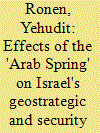

|
|
|
|
|
| Publication |
2014.
|
| Summary/Abstract |
This article explores the identity, characteristics and activities of the jihadist community in the Sinai Peninsula, as well as the ideological affinity, flow of weapons and military cooperation between it and like-minded organizations in the Gaza Strip and beyond. It also analyses the ramifications of these organizations' increased military power and political and ideological stature in Israel's geostrategic environment.
|
|
|
|
|
|
|
|
|
|
|
|
|
|
|
|
| 4 |
ID:
129161
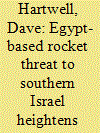

|
|
|
| 5 |
ID:
130942
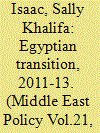

|
|
|
|
|
| Publication |
2014.
|
| Summary/Abstract |
This paper tackles the political and security complications of the Egyptian transition from its inception in January 2011 until the fall of the Muslim Brotherhood president, Mohamed Morsi, in July 2013, with a primary focus on how these complications are of strategic importance to Europe. It starts with inferring Egypt's role in European Union (EU) approaches to security in the Mediterranean, which were acknowledged in the 2003 European Security Strategy and then largely interpreted in the 2004 European Neighborhood Policy. It argues that the old EU democracy-stability dilemma persisted in Europe's approach to the Egyptian transition, especially during Morsi's one-year presidency. In discussing the current political and security complications of the Egyptian transition and how they constitute strategic concerns to Europe, the analysis tackles undermined social cohesion in Egypt due to processes of repolarization in Egyptian society after July 2013; the question of Egypt's porous borders with the Hamas-controlled Gaza Strip; the emergence of the Sinai Peninsula as a jihadist center; and the rising importance of economics in the EU-Egyptian relationship
|
|
|
|
|
|
|
|
|
|
|
|
|
|
|
|
| 6 |
ID:
174376
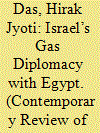

|
|
|
|
|
| Summary/Abstract |
Historically, Israel has been dependent on the imports of oil, coal, and natural gas to meet its energy demands, and energy security is an integral part of its security and foreign policy. In its neighborhood, gas relations with Egypt began in 2008, which was terminated in 2012, thereby propelling Israel to diversify its imports and explore domestic production. The latter inverted the energy balance that transformed Israel from being a buyer, and Egyptian firms have shown interest to open their market for Israeli gas. At the same time, fresh gas discoveries in Egypt have opened up new policy options and challenges for Israel. The research would be exploratory and contextualize the Israel–Egyptian relations through the prism of energy and focus on the potential for Israel’s gas diplomacy and engagement and would evaluate the drawbacks and challenges in its energy policy vis-à-vis Egypt.
|
|
|
|
|
|
|
|
|
|
|
|
|
|
|
|
| 7 |
ID:
130251
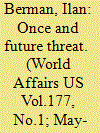

|
|
|
|
|
| Publication |
2014.
|
| Summary/Abstract |
Is al-Qaeda really on the run? Since the death of Osama Bin Laden, the Obama administration has actively promoted the narrative that it has gained the upper hand in its struggle with the world's most dangerous terrorist group. The president himself, as well as a variety of other US officials, have insisted time and again that al-Qaeda is "decimated" and on a "path to defeat." But reports of the terror group's death, to borrow a phrase from Mark Twain, have been greatly exaggerated. Although it suffered considerable operational setbacks over the past decade, al-Qaeda has proven both adaptive and resilient. Today, its two principal offshoots pose growing challenges to stability in North Africa and the southern Persian Gulf. The changing organization now sees growth opportunities in the deepening civil war in Syria, growing disorder in post-Saddam Hussein Iraq, lawlessness in the Sinai Peninsula, and the impending US withdrawal from Afghanistan. In all of these hot spots it is looking to expand its franchises and threaten US interests. Moreover, as a result of America's progressive disengagement from the Middle East and North Africa, al-Qaeda is poised to discover still greater room for maneuver in the years ahead.
The most important fact about al-Qaeda is that it is an evolving organization, far different from the one that carried out the attacks of September 11, 2001. The years since then have seen its forces significantly eroded in Afghanistan, where coalition operations succeeded in whittling away at the core group of militants that made up what can be called al-Qaeda "central." In the summer of 2010, then CIA Director Leon Panetta estimated there were just fifty to one hundred al-Qaeda fighters in the group's country of origin. A similar number was reported to be operating in Afghanistan by a coalition general last year.
|
|
|
|
|
|
|
|
|
|
|
|
|
|
|
|
|
|
|
|
|